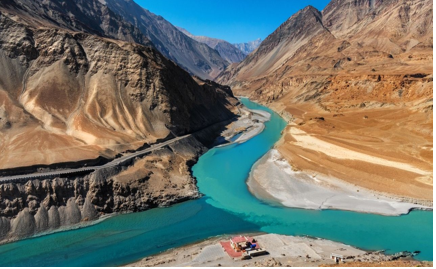i INP-WEALTHPK
Azeem Ahmed Khan
India’s unilateral suspension of the Indus Waters Treaty (IWT) could seriously impact Pakistan’s agriculture, industries and food supplies, said an expert.

“Our irrigation network directs nearly 90% of surface water through an extensive canal system that feeds the main agricultural crops including wheat, rice and cotton,” Head of Centre for Private Sector Engagement at the Sustainable Development Policy Institute, Ahad Nazir told WealthPK.
Domestic water governance is already strained, he said, adding that according to the Indus River System Authority (IRSA), Punjab mostly meets its quota, while Sindh endures frequent shortages, disrupting crop calendars.
About 30 percent of canal water is lost because of seepage, breaches and antiquated lining, he said. Water user associations lack funds and legal authority to resolve disputes at distributary levels, he added. Ahad said the provincial irrigation departments maintain separate data systems, which hampers real‑time coordination at barrages and bypass channels.
According to the World Bank analysis, the pact assigns India the control of Ravi, Beas and Sutlej, while Pakistan secures roughly 80 percent of the Indus, Jhelum, and Chenab. Hydrologists warn that abrupt drawdown of Chenab or Jhelum flows could either flood headworks or leave downstream canals dry, disrupting the sowing schedules, he added.
Ahad Nazir said the reservoir operators at Tarbela and Mangla dams, which are already coping with sedimentation and unpredictable monsoon patterns, depend on basin‑wide flow forecasts. This critical data would no longer be available without treaty‑mandated sharing. In the absence of this data, the farmers would pump more groundwater, accelerating depletion in Sindh’s delta and Balochistan’s arid regions, he added.
Agriculture supports over one-third of the country’s workforce and contributes nearly 25% of the GDP, he said. Even a 10% drop in water supply could cut crop output by billions of dollars and result in job losses across the agricultural value chain – from processing, transport and inputs, he added.
According to the Food and Agriculture Organization (FAO), Ahad said the shrinking domestic harvests lead to larger imports, putting pressure on foreign reserves and pushing up food prices. The manufacturing sector also faces similar risks, he added. Hydropower supplies about one‑fifth of Pakistan’s electricity, so unpredictability in river flows would boost reliance on expensive thermal plants and increase loadshedding, Ahad said.
Textile mills, rice hullers and sugar factories need steady water and power to meet export contracts worth over $7 billion annually, he said. Any disruption could lead to order cancellations and substantial revenue losses, he added. Legally, the treaty does not contain an exit clause, he noted.
Experts from the Centre for Policy Research pointed out that arbitration at The Hague remains Pakistan’s main defense, yet it cannot prevent sudden operational changes upstream, Ahad said.
To shield against shocks, he suggested, Pakistan must reform its internal governance by accelerating canal automation and lining, empowering water user associations to enforce fair distribution, unify data protocols across provinces and expand storage capacity.
Shifting to crops that use less water and adopting modern irrigation techniques will ease pressure, he said. Simultaneously, urgent diplomatic efforts with India and the World Bank could restore provisional flow‑data sharing until the trust is rebuilt, he added.
Credit: INP-WealthPk


